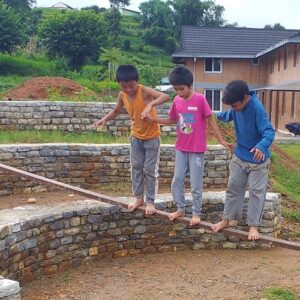With the global pandemic of 2020, Mother Nature has finally had some time to recuperate and restore a little balance in her ecosystems. It’s a time of contemplation for the human species and HOPE that our old habits of mindless consumerism may change and economies rethink to adopt more sustainable solutions. There is talk in the air that the internet may crash anytime soon as the world population goes online. If it does, perhaps it may be a good thing.
Nepal is going through a lockdown period as well for 3 weeks. Work on the house and yogashala have come to a standstill as we are not able to get the required materials in. Nevertheless, we are probably in a better place now than most people living in the cities. Although the boys have stopped all activity with the other children, we are still able to take walks and short hikes whilst maintaining our distance, and play football and volleyball with our multi-skilled workers who live on site.
Everyone else in Astam are hard at work cultivating their lands in preparation for planting seeds of corn, kodo millet and paddy. On our fields, Raju and his 2 sons, Anil and Arjun are kindly assisting Ram with planting 3 types of corn, cucumbers, chillies, ginger and a variety of other vegetables.



With more indoor time, the boys have taken to playing Monopoly every day. We discovered that Monopoly has its origin in 1903! The earliest known version was known as the Landlord’s Game, designed by a left-wing feminist, Elizabeth Magie in Washington DC. But her place in the game’s history was lost for decades and ceded to the man who had picked it up at his friend’s house: Charles Darrow. To Elizabeth Magie, the problems of the new century were so vast, the income inequalities so massive and the monopolists so mighty that it seemed impossible that an unknown woman, working as a stenographer then, stood a chance at easing society’s ills with a board game. It was the early 1900s, and she desperately wanted her board game to reflect her progressive political views.
She began speaking in public about a new concept which she called the Landlord’s Game. She also commented in a political magazine that, “It is a practical demonstration of the present system of land-grabbing with all its usual outcomes and consequences. It might well have been called the ‘Game of Life’, as it contains all the elements of success and failure in the real world, and the object is the same as the human race in general seems to have – the accumulation of wealth.”

Little A has somehow developed a fixation for numbers, buying and selling properties and accumulating wealth. The credit may well be given to Elizabeth Magie. Monopoly is all he wants to do, day and night. The boys have also created their own version of Monopoly KL.


Math was introduced shortly after Little A turned 5 in January. We started by adding and subtracting simple single numbers. He took it in his stride and began to take keen interest in all manners of numbers from book pages, price tags in restaurant menus, calendars, road signs, car number plates, lift buttons and everything else that has numbers printed on it. In a span of 3 months, he is asking for bigger numbers in the thousands and millions. I think Little A configures numbers as patterns and taking the role of a daily Monopoly banker has set some wheels in motion.
Big A, on the other hand, who finds little joy in Math, has been subjected to a metamorphosism of a different kind. He devours a book a day, akin to a curled up worm. He lives in the world of David Walliams and Jeff Kinney and is often oblivious to the world around him. As we have yet to receive our belongings, apparently stuck in the port of Kolkata due to the lockdown, he has been re-reading his books fourfolds. We have been coping pretty well living with our suitcases but my heart cries out to the 21 boxes – 9 of which are books that will hopefully find its way back to us.



See Ming
9 Apr 2020Big hugs. ❤️